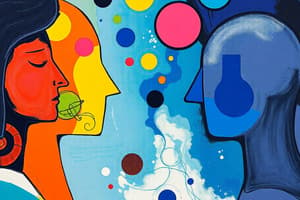Podcast
Questions and Answers
Which type of discourse is primarily focused on using language to create a vivid mental image?
Which type of discourse is primarily focused on using language to create a vivid mental image?
- Expository Discourse
- Narrative Discourse
- Descriptive Discourse (correct)
- Argumentative Discourse
Which of these discourses is typically utilized in essays and research papers?
Which of these discourses is typically utilized in essays and research papers?
- Expository Discourse (correct)
- Descriptive Discourse
- Argumentative Discourse
- Narrative Discourse
In what type of discourse would you expect to find a logical sequence of events or ideas?
In what type of discourse would you expect to find a logical sequence of events or ideas?
- Narrative Discourse (correct)
- Argumentative Discourse
- Expository Discourse
- Literary Discourse
Which type of discourse emphasizes the use of evidence to support a claim?
Which type of discourse emphasizes the use of evidence to support a claim?
Which discourse is primarily concerned with conveying information and explaining concepts?
Which discourse is primarily concerned with conveying information and explaining concepts?
Which type of discourse encompasses creative works like poems, short stories, and novels?
Which type of discourse encompasses creative works like poems, short stories, and novels?
What is a characteristic of academic discourse?
What is a characteristic of academic discourse?
Which discourse is often characterized by formal writing and in-depth analysis?
Which discourse is often characterized by formal writing and in-depth analysis?
Which of these is NOT an example of a typical application of expository discourse?
Which of these is NOT an example of a typical application of expository discourse?
Which type of discourse would be most suitable for writing a persuasive essay arguing for a specific policy change?
Which type of discourse would be most suitable for writing a persuasive essay arguing for a specific policy change?
What is the primary purpose of a discourse aimed at persuasion?
What is the primary purpose of a discourse aimed at persuasion?
Which of the following is NOT a characteristic of expository discourse?
Which of the following is NOT a characteristic of expository discourse?
What is a key advantage of discourse in terms of learning?
What is a key advantage of discourse in terms of learning?
Which type of discourse is primarily focused on telling a story?
Which type of discourse is primarily focused on telling a story?
What is NOT a method that a persuasive discourse can use to sway an audience?
What is NOT a method that a persuasive discourse can use to sway an audience?
Which of the following best describes the nature of discourse?
Which of the following best describes the nature of discourse?
How can discourse be used to entertain?
How can discourse be used to entertain?
What is a key difference between expository and persuasive discourse?
What is a key difference between expository and persuasive discourse?
Which type of discourse would be most suitable for explaining the scientific process of photosynthesis?
Which type of discourse would be most suitable for explaining the scientific process of photosynthesis?
What is a common characteristic of discourse in both its written and verbal forms?
What is a common characteristic of discourse in both its written and verbal forms?
Flashcards
Discourse
Discourse
Forms of communication like written, verbal, or visual.
Purpose of Discourse
Purpose of Discourse
The primary goals are to inform, persuade, or entertain.
Expository Discourse
Expository Discourse
Communication that explains, informs, or describes a topic.
Persuasive Discourse
Persuasive Discourse
Signup and view all the flashcards
Descriptive Discourse
Descriptive Discourse
Signup and view all the flashcards
Narrative Discourse
Narrative Discourse
Signup and view all the flashcards
Argumentative Discourse
Argumentative Discourse
Signup and view all the flashcards
Engaging Discourse
Engaging Discourse
Signup and view all the flashcards
Rhetorical Devices
Rhetorical Devices
Signup and view all the flashcards
Multiple Perspectives
Multiple Perspectives
Signup and view all the flashcards
Literary Discourse
Literary Discourse
Signup and view all the flashcards
Academic Discourse
Academic Discourse
Signup and view all the flashcards
Sensory Details
Sensory Details
Signup and view all the flashcards
Sequential Order
Sequential Order
Signup and view all the flashcards
Creative Works
Creative Works
Signup and view all the flashcards
Formal Writing
Formal Writing
Signup and view all the flashcards
Study Notes
Connected Discourse - Reading and Writing 11
- Learning Objectives:
- Identify the nature and purpose of a discourse.
- Differentiate between types of discourses.
- Differentiate between types of literary discourses.
What is a Discourse?
- Defined by Scollon and Scollon (2001) as a language or system of representation that develops socially to create and circulate coherent meanings about a topic area.
- A discourse is used to describe various forms of communication (written, verbal, visual). It analyzes language and communication as social phenomena.
- In written form, it's a formal, lengthy discussion of a topic, where concepts are logically organized.
Purposes of a Discourse:
- To Inform: Sharing information through conversations, debates, or other communication. Involves multiple perspectives to gain new ideas and insights. Improves understanding of topics.
- To Persuade: Presenting an argument in favor of a particular viewpoint. Uses persuasive language, logical reasoning, rhetorical devices, evidence, personal anecdotes, and stories to make the point more relatable.
- To Entertain: Provides interesting topics of conversation/debate, humor, storytelling, and anecdotes. Engages audiences with thought-provoking questions and fresh perspectives.
Types of Discourses:
- Expository: Explains, informs, or describes a topic or issue. Based on facts and data, usually objective, often seen in essays, research papers.
- Descriptive: Creates a vivid mental image of the topic. Uses language to paint a picture of a person, place, thing, or idea. Typically includes sensory details.
- Narrative: The way stories are told. Ideas, events, and experiences are sequenced logically; conveying information or creating a sense of purpose.
- Argumentative: Involves making a claim and providing evidence to support it. Presents logical and convincing arguments to persuade the audience to accept a point of view.
Literary Discourse
- Focused on creative works (poetry, short stories, novels, plays).
- Also includes business communication texts like letters and resumes.
Academic Discourse
- Language and concepts used when academics communicate.
- Characterized by formal writing, research-based evidence, in-depth topic analysis.
Written Task #1 (Expository Discourse):
- Choose one topic for an expository essay (e.g., music's impact, technology's effect on literature, AI importance, technology's harms).
- Write the essay on a single sheet of yellow paper in English.
Studying That Suits You
Use AI to generate personalized quizzes and flashcards to suit your learning preferences.




